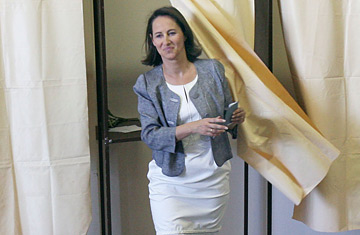
Segolene Royal, the Socialist Party's candidate, votes during the first round of the French presidential elections, in Melle, France, Sunday, April 22, 2007.
"We were confident, but after the shock of Le Pen sneaking by us into the runoff in 2002, no one could feel safe," admits party member Arnaud Sanchez, 20. That forced many Socialist voters to "hold their nose," as Sanchez puts it, and vote for Chirac to ensure the defeat of the anti-immigration Le Pen. "I was ashamed to go abroad and have to explain to people how someone like Le Pen could get that far — meanwhile, the urgency to deny Le Pen meant France got a default president in Chirac," says Sanchez. "Thank goodness this time it's different."
"Five years ago tonight, it was if the world learned France was racist and xenophobic," says Mohammed Driss, 43, a leftist voter who, like hundreds of others, came to Rue Solferino to await the initial election results on Sunday night. "Tonight, France sent a new message: 2002 was a big mistake."
Annick Lepetit, a Socialist Party official and member of parliament from Paris, agrees that Royal's presence in the second round corrects the anomaly of five years ago, when the presidential runoff amounted to a choice between the center-right and the far right. "This time, voters will have the choice between two different programs and visions for France — one from the right, the other from the left," Lepetit says. "For that reason, whoever wins will have a legitimacy to rule that's been absent the last five years."
Relief rather than triumph was the prevailing mood outside Socialist headquarters. Their road to the Elysee Palace remains an uphill climb. Although Royal's first round vote tally of 25.8% is better than Francois Mitterrand's performance in his victorious 1981 presidential run, Sarkozy's 31.1% is even more formidable. While the Socialist candidate can count on the backing of most far-left candidates in the runoff, their first-round share added with the Socialists' is only 36.2%. And if much of Jean Marie Le Pen's 10.4% transfer their support to the tough-on-immigration Sarkozy, the outcome of the presidential race will be decided by the 18.5% of voters who backed split-the-difference centrist Francois Bayrou. Bayrou only recently began distancing himself from Sarkozy and the ruling conservatives after having been a close ally (and twice member of government) of French conservatives for much of the past two decades.
The buzz Sunday night on Rue Solferino was that to lure Bayrou voters behind Royal, Socialists would seize on another factor in first-round polling: Le Pen's collapse, which saw his share of the vote almost halved from the tally he scored in 2002. Much of that erosion, analysts say, came as a result of Sarkozy's unabashed efforts to seduce Le Pen voters with hard-line positions on crime, immigration, and dealing with France's troubled suburban housing projects. Socialist supporters believe that by associating Sarkozy with the politics of Le Pen, they can persuade centrist voters to back Royal.
But that won't be easy. Many influential figures from Bayrou's Union for French Democracy (UDF) party had already joined the Sarkozy campaign before the first round; the majority of UDF members are thought to favor Sarkozy's liberal economic program more than they resent his gestures to the extreme right. That leaves independent centrists and Socialists whose disdain for Royal sent them flocking to Bayrou in the first place — a demographic essential to lure back, with early polls showing Sarkozy beating Royal in the run-off 54% to 46%. "This is an entirely new campaign," Lepetit says. "It's one in which voters will have to decide between fear, xenophobia, and a very small view of France and its place in the world, and one that wants to open up, evolve, and move ahead together."
Party member Sanchez agrees that Bayrou centrists can be drafted to push Royal past Sarkozy into the Elysee. But even if that fails, Sanchez echoes a sentiment heard all down the Rue Solferino Sunday night. "At least this time, voters have a clear choice between two contrasting programs," Sanchez notes. "The next president won't win on default."
